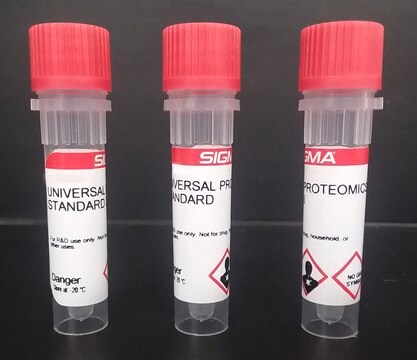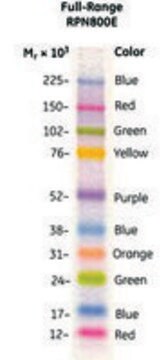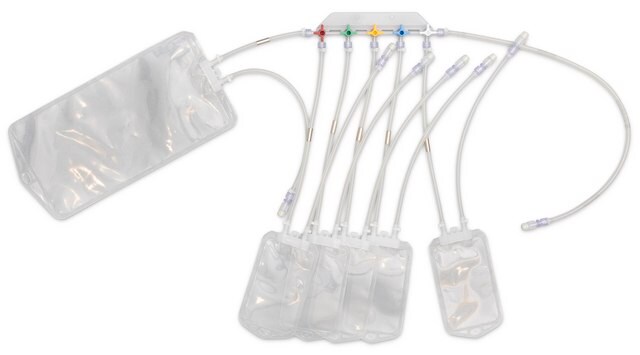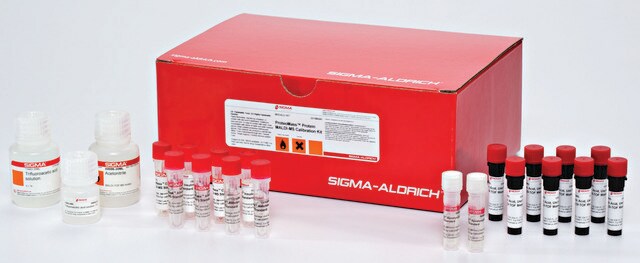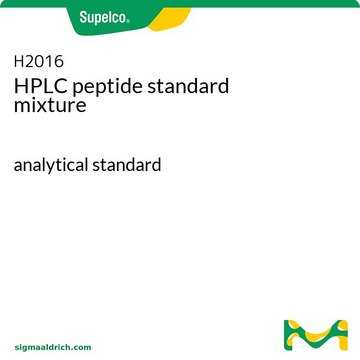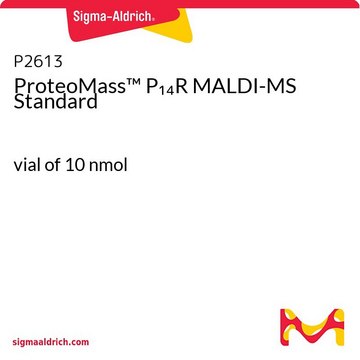UPS2
Proteomics Dynamic Range Standard Set
Protein Mass Spectrometry Calibration Standard
Synonyme(s) :
Dynamic Range Standards, Proteomics Standard Set
About This Item
Produits recommandés
Source biologique
human
Niveau de qualité
Forme
ready-to-use solution
Qualité
Protein Mass Spectrometry Calibration Standard
Concentration
10.6 μg/ampule protein
Technique(s)
mass spectrometry (MS): suitable
Conditions d'expédition
wet ice
Température de stockage
−20°C
Catégories apparentées
Description générale
Application
Proteomics Dynamic Range Standard Set has been used for the quantification of dynamic range universal protein standard on Orbitrap Analyzer using all ion fragmentation. It has been used as a standard for intensity-based absolute quantification of proteins (iBAQ) in LC-MS (liquid chromatography-mass spectrometry)/MS analysis.
Composants de kit également disponibles séparément
- T6567Trypsin from porcine pancreas, Proteomics Grade, BioReagent, Dimethylated 20 μgFDS
Produit(s) apparenté(s)
Mention d'avertissement
Danger
Mentions de danger
Conseils de prudence
Classification des risques
Eye Dam. 1 - Repr. 1B - Resp. Sens. 1 - Skin Irrit. 2 - STOT SE 3
Organes cibles
Respiratory system
Code de la classe de stockage
6.1C - Combustible acute toxic Cat.3 / toxic compounds or compounds which causing chronic effects
Point d'éclair (°F)
Not applicable
Point d'éclair (°C)
Not applicable
Certificats d'analyse (COA)
Recherchez un Certificats d'analyse (COA) en saisissant le numéro de lot du produit. Les numéros de lot figurent sur l'étiquette du produit après les mots "Lot" ou "Batch".
Déjà en possession de ce produit ?
Retrouvez la documentation relative aux produits que vous avez récemment achetés dans la Bibliothèque de documents.
Les clients ont également consulté
Contenu apparenté
Standardize Your Research. We offer both the Universal Proteomics Standard and the Proteomics Dynamic range Standard as complex, well-defined, well characterized reference standards for mass spectrometry.
Notre équipe de scientifiques dispose d'une expérience dans tous les secteurs de la recherche, notamment en sciences de la vie, science des matériaux, synthèse chimique, chromatographie, analyse et dans de nombreux autres domaines..
Contacter notre Service technique